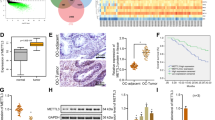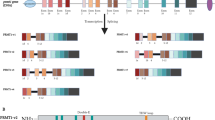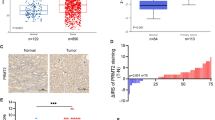Abstract
Protein arginine methylation, which is mediated by a family of protein arginine methyltransferases (PRMTs), is associated with numerous fundamental cellular processes. Accumulating studies have revealed that the expression of multiple PRMTs promotes cancer progression. In this study, we examined the role of PRMT1 in ovarian cancer cells. PRMT1 is expressed in multiple ovarian cancer cells, and the depletion of its expression suppressed colony formation, in vivo proliferation, migration, and invasion. To gain insight into PRMT1-mediated cancer progression, we searched for novel substrates of PRMT1. We found that FAM98A, whose physiological function is unknown, was arginine-methylated by PRMT1. FAM98A is expressed in numerous ovarian cancer cell lines and is important for the malignant characteristics of ovarian cancer cells. Our results indicate the possible role of the PRMT1-FAM98A pathway in cancer progression.




Similar content being viewed by others
References
Karve TM, Cheema AK. Small changes huge impact: the role of protein posttranslational modifications in cellular homeostasis and disease. J Amino Acids. 2011;2011:207691.
Gary JD, Clarke S. RNA and protein interactions modulated by protein arginine methylation. Prog Nucleic Acid Res Mol Biol. 1998;61:65–131.
Boffa LC, Karn J, Vidali G, Allfrey VG. Distribution of NG, NG,-dimethylarginine in nuclear protein fractions. Biochem Biophys Res Commun. 1977;74:969–76.
Feng Y, Hadjikyriacou A, Clarke SG. Substrate specificity of human protein arginine methyltransferase 7 (PRMT7): the importance of acidic residues in the double E loop. J Biol Chem. 2014;21; 289(47):32604–16.
Zurita-Lopez CI, Sandberg T, Kelly R, Clarke SG. Human protein arginine methyltransferase 7 (PRMT7) is a type III enzyme forming ω-NG- monomethylated arginine residues. J Biol Chem. 2012;287:7859–70.
Yang Y, Hadjikyriacou A, Xia Z, Gayatri S, Kim D, Zurita-Lopez C, et al. PRMT9 is a Type II methyltransferase that methylates the splicing factor SAP145. Nature Commun. 2015;6:6428.
Bedford MT, Clarke SG. Protein arginine methylation in mammals: who, what and why. Mol Cell. 2009;33:1–13.
Yu Z, Chen T, Hebert J, Li E, Richard S. A mouse PRMT1 null allele defines an essential role for arginine methylation in genome maintenance and cell proliferation. Mol Cell Biol. 2009;29:2982–96.
Bedford MT, Richard S. Arginine methylation an emerging regulator of protein function. Mol Cell. 2005;18(3):263–72.
Thandapani P, O’connor TR, Bailey TL, Richard S. Defining the RGG/RG motif. Mol Cell. 2013;50:613–23.
Seligson DB, Horvath S, McBrian MA, Mah V, Yu H, Tze S, et al. Global histone modification patterns predict risk of prostate cancer recurrence. Nature. 2005;435:1262–6.
Le Romancer M, Treilleux I, Bouchekioua Bouzaghou K, Sentis S, Corbo L. Methylation, a key step for nongenomic estrogen signaling in breast tumors. Steroids. 2010;75:560–4.
Cheung N, Chan LC, Thompson A, Cleary ML, So CW. Protein arginine methyltransferase-dependent oncogenesis. Nature Cell Biol. 2007;9:1208–15.
Yoshimatsu M, Toyokawa G, Hayami S, Unoki M, Tsunoda T, Field HI, et al. Dysregulation of PRMT1 and PRMT6, Type I arginine methyltransferases, is involved in various types of human cancers. Int J Cancer. 2011;128:562–73.
Mathioudaki K, Papadokostopoulou A, Scorilas A, Xynopoulos D, Agnanti N, Talieri M. The PRMT1 gene expression pattern in colon cancer. Br J Cancer. 2008;99:2094–9.
Mathioudaki K, Scorilas A, Ardavanis A, Lymberi P, Tsiambas E, Devetzi M, et al. Clinical evaluation of PRMT1 gene expression in breast cancer. Tumour Biol. 2011;32:575–82.
Zou L, Zhang H, Du C, Liu X, Zhu S, Zhang W, et al. Correlation of SRSF1 and PRMT1 expression with clinical status of pediatric acute lymphoblastic leukemia. J Hematol Oncol. 2012;5:42.
Avasarala S, Van Scoyk M, Karuppusamy Rathinam MK, Zerayesus S, Zhao X, Zhang W, et al. PRMT1 is a novel regulator of epithelial-mesenchymal-transition in non-small cell lung cancer. J Biol Chem. 2015;290(21):13479–89.
Baldwin RM, Morettin A, Paris G, Goulet I, Côté J. Alternatively spliced protein arginine methyltransferase 1 isoform PRMT1v2 promotes the survival and invasiveness of breast cancer cells. Cell Cycle. 2012;11(24):4597–612.
Kajiyama H, Kikkawa F, Suzuki T, Shibata K, Ino K, Mizutani S. Prolonged survival and decreased invasive activity attributable to dipeptidyl peptidase IV overexpression in ovarian carcinoma. Cancer Res. 2002;62:2753–7.
Yamaguchi A, Kitajo K. The effect of PRMT1-mediated arginine methylation on the subcellular localization, stress granules, and detergent-insoluble aggregates of FUS/TLS. PLoS One. 2012;7(11):e49267.
Pérez-González A, Pazo A, Navajas R, Ciordia S, Rodriguez-Frandsen A, Nieto A. hCLE/C14orf166 associates with DDX1-HSPC117-FAM98B in a novel transcription-dependent shuttling RNA-transporting complex. PLoS One. 2014;9(3):e90957.
Popow J, Jurkin J, Schleiffer A, Martinez J. Analysis of orthologous groups reveals archease and DDX1 as tRNA splicing factors. Nature. 2014;511(7507):104–7.
Acknowledgments
We appreciate the members of the Division of Cancer Biology for their helpful discussions and technical assistance. This research was funded by the Ministry of Education, Culture, Sports, Science and Technology of Japan (Nanomedicine Molecular Science, 2306) and by the Takeda Science Foundation.
Author information
Authors and Affiliations
Corresponding author
Ethics declarations
Animal experiments were conducted in accordance with the regulations of the Faculty of Medicine of Nagoya University.
Electronic supplementary material
Below is the link to the electronic supplementary material.
ESM 1
(PDF 56 kb)
Rights and permissions
About this article
Cite this article
Akter, K.A., Mansour, M.A., Hyodo, T. et al. FAM98A is a novel substrate of PRMT1 required for tumor cell migration, invasion, and colony formation. Tumor Biol. 37, 4531–4539 (2016). https://doi.org/10.1007/s13277-015-4310-5
Received:
Accepted:
Published:
Issue Date:
DOI: https://doi.org/10.1007/s13277-015-4310-5




